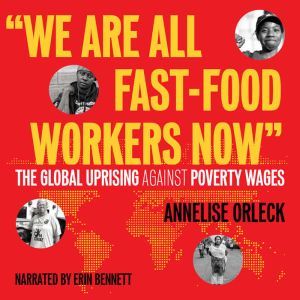Quotes
“This is a well-documented introduction to unionization efforts by often marginalized, behind-the-scenes workers.”—Booklist
“Powerful, sobering, and timely, this is a much-needed global examination of poverty wages.”—Foreword Reviews
“Stunning in its breadth and impact, filled with vivid characters from many countries who speak in as many languages, the book is an epic achievement—it shows us globalization from the perspective of the people who do its work.”—Linda Gordon, author of The Second Coming of the KKK
“With common sense and a lot of fire, low-wage workers across the globe are building social movements. Crafted with corazón, this book is a crisply paced, panoramic labor history of the here and now.”—Vicki L. Ruiz, author of From Out of the Shadows
“A vivid rendering of the human impact of free trade policies and neoliberal restructuring across the globe. Annelise Orleck tells the stories of members of the global ‘precariat’ in the Philippines, Cambodia, Bangladesh, the US, and elsewhere, and their struggles for a living wage. A welcome addition to courses on social inequalities, social movements, and social change, it will shift how students see the hamburgers they eat and the clothes they wear.”—Professor Arlene Stein, Institute for Research on Women at Rutgers University
“Annelise Orleck takes us on an inspiring journey across Asia, the Americas, and Europe into the world of low-wage organizing. With an ethnographer’s eye, historian’s perspective, and activist’s passion, she not merely charts the precariousness of work under a rapacious capitalism but captures the power of protest to transform lives. A must for classes in Labor, Globalization, and Gender.”—Professor Eileen Boris, Hull Professor of Feminist Studies, University of California, Santa Barbara
“Essential reading for any law student or legal professional seeking to harness law in service of social justice. As she illuminates the precarity uniting workers around the globe, Orleck calls out the laws and legal structures that have failed them, while also highlighting creative legal strategies for demanding dignity and basic security.”—Professor Karen Tani, Assistant Professor of Law, University of California, Berkeley
“A wonderful and urgent history-of-the-present. I often struggle with finding powerful and evocative treatments of contemporary social movements that measure up to the riveting, richly contextualized histories we have for the civil rights era. This book does that—and embeds US struggles in a global movement for anti-poverty wages and humane conditions.”—Professor Jeanne Theoharis, Distinguished Professor of Political Science at Brooklyn College and author of A More Beautiful and Terrible History
“Annelise Orleck skillfully weaves an inspiring global narrative of protest, coalition and empowerment—a narrative essential to students of oral history, testimony and witness, and activism in the face of a global economy of indifference and disposability. This is a model of engaged scholarship, empathic and respectful toward its subjects, enabling to its readers.”—Professor Marianne Hirsch, William Peterfield Trent Professor of English and Comparative Literature and Professor in the Institute for Research on Women, Gender, and Sexuality at Columbia University
“Bursting with the heartrending voices of the precariat…this book captures the unspeakably inhumane working conditions and courageous determination driving the global uprisings against unrestrained capitalism. A must read for students of history, women and feminist studies, class and labor, race and ethnicity, and international studies, it is a twenty-first-century grassroots primer for social justice organizing, and a clarion call to exalt human beings over the insatiable hungry ghosts of profit and consumption.”—Rhonda Y. Williams, author of Concrete Demands and Professor and John L. Seigenthaler Chair in American History, Vanderbilt University




